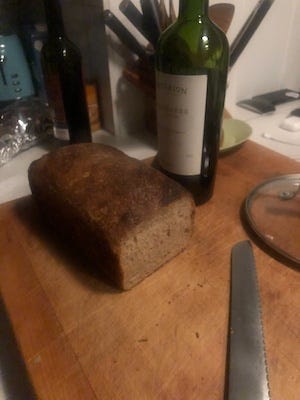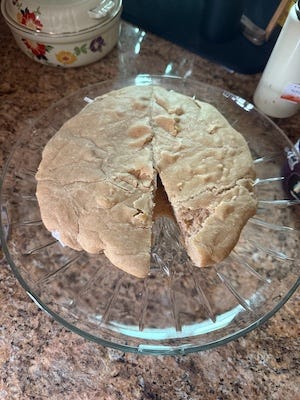The Loaf Less Traveled
What sourdough is teaching me about trying, failing, and starting over.
I’ve had a passion for cooking since I was a teenager.
Passion? Is that the right word?
Maybe it was more of an interest, really. When I was younger and still living at home, I’d borrow cookbooks from the library and try out recipes at home.
Most of them got a thumbs-up from the family. I tried my hand at baking, chocolates, Italian and French cuisine, and whatever else piqued my curiosity.
I remember one time preparing a particularly fancy dish and convincing my folks that the meal would be best served with some accompanying classical music. The things parents do for their children!
As I got older, I found less time to dabble in the culinary arts, but every now and then the muse would strike.
During the height of a Tim Ferriss wave, I was reading everything he was publishing, including The 4-Hour Chef. Which of course meant buying a bunch of new cooking tools and discovering a newfound appreciation for the cast iron skillet.
Growing up in a Salvadoran household, it wasn’t a pan I was familiar with. We were more of a tortillas, beans, and rice kitchen.
As far as culinary inspiration, I was a big fan of all the Anthony Bourdain shows (RIP). When Netflix launched their Chef’s Table series, I was all in. They definitely nailed the concept of “food-porn” (apologies for the implied vulgarity, but it sorta nails the vibe).
Their mix of music, videography, and storytelling is superb. Each chef’s unique skills are highlighted brilliantly. I’ve always been drawn to the meticulous preparation that goes into these dishes—it speaks to my slightly OCD, neurodivergent tendencies for sure!
Now that I think of it, there are a few movies and documentaries I love, that capture the energy of food as an event. Some of my favorites, in no particular order: Jiro Dreams of Sushi, Big Night (with Stanley Tucci), Chef (Jon Favreau & John Leguizamo), the TV series The Bear, and I’m sure a few others I’m forgetting.
I’m fairly certain I was a chef or restaurant owner in a previous life—there’s always been a draw to that vibe.
Recently, I discovered the magic of sourdough bread. On a trip with my partner last year to visit one of her college friends, I happened upon a few books on baking that caught my eye. Thankfully, I had enough downtime to read through a few and began my bread-making journey.
Here’s a pic of my first successful sourdough loaf!
As it turns out, that curiosity in the kitchen started spilling over into other parts of my life as well.
My partner and I have to a plan to be more self-sustaining. As a result we now have five chickens, our own well, and this year we planted a sizable garden.
Yes, it’s a lot of work and can seem overwhelming at times, but I keep reminding myself that I’m rewiring my long-ingrained “city-guy” tendencies.
Back to the bread…
The one thing that separates sourdough from other bread-making is the need for cultivating a sourdough starter. It’s a small mix of water and flour that you let sit over the course of a few days. When it’s nice and sour (you’ll know by the smell), you then use that starter to make your bread.
I’m greatly oversimplifying the process. In actuality, there’s a pre-ferment phase, followed by several rounds of kneading, more proofing, and then high-temp baking.
It’s the science of it that draws me in—the need to follow precise steps. As you might imagine, with all these moving parts, there’s a lot that can go wrong.
My first few loaves came out OK, and I felt I had a good routine. So when I recently discovered a company that makes ancient grain flour, I was excited to try it!
If you’ve ever traveled to Europe and indulged in bread, pizza, croissants, or any of the other ridiculously delicious foods found on that continent, you might’ve noticed a difference in how you feel were you to indulge in these foods state-side. To use a technical term, less shitty.
Why is that? I’ve come to learn over the years just how bad our wheat is here in the U.S. We have companies like Monsanto to thank for that. It’s no secret how much glyphosate has made its way into our food system and wreaked havoc on our health.
It was no surprise to learn that these chemicals are banned in Europe. Smart move.
Thankfully, more and more companies are doing their part to bring us back to food in its natural form. That’s why I was excited to discover Sunrise Flour Mill. They’ve developed a version of Single Source Organic Heritage Wheat Flour. I highly recommend you watch their origin story video on their About page, very inspiring!
I proceeded to order some of their starter and bread flour and was eager to see how it would turn out.
Well, let’s just say… it didn’t go quite as planned. After several beautiful loaves, this most recent one resulted in what I can only describe as an Unidentified Baking Object, or UBO. In other words: #NoBueno.
Granted, the steps were different than I was used to, but I didn’t even come close on this one.
Needless to say, I was a bit bummed to have spent a week and a half prepping this new starter and following all the steps, only to end up with this disappointing doorstop.
It took a few days of moping before I returned to my original recipe—and I was happy to see my tried-and-true loaf come out of the oven a few days ago.
What I learned from this recent experience is that things don’t always turn out the way you planned, even if you think you’re doing everything absolutely right. It’s frustrating for sure.
“But I followed all the instructions!”
Yeah, I get it. But sometimes life wants to remind us that even the best-laid plans go awry.
And that’s OK. It’s not your fault.
And there’s always tomorrow.
I hope this inspires you to revive a long-forgotten hobby or passion.
Remember, the goal isn’t perfection—it’s to enjoy the mess, the learning, and maybe even the occasional UBO.
With gratitude,
Harry
P.S. It never ceases to amaze me just how much I can get done on a short flight. Focused work for the win!
🎤 When you’re ready, a few ways i can help…
Done-For-You - Are you a business owner that’s clear on your messaging and ready to launch your own authority-building podcast with the full launch, production and marketing support of our team? Watch This Video
Done-With-You - Do you have a podcast idea in mind and looking for the support of a community and a little hand-holding from me to keep you accountable? Join The Stage
VIP Days - Need focused, hands-on support to launch or grow your podcast? In just one day, we’ll tackle high-impact tasks like creating your podcast framework, launching your show, auditing for growth, setting up email sequences, or running targeted ads. Book Your VIP Day
👋 what i’ve created recently…
/// podcast junkies
368 Rocío Pérez’ Emotional Journey From Brain Tumor to Breakthrough
Rocío Pérez, Chief Leadership Officer at Virtuous, shares her transformative journey from surviving a brain tumor to creating the Mind Shift game and TV show. She discusses her intuitive wisdom, entrepreneurial spirit, and the importance of self-transformation in leadership. Pérez also reveals her plans for expanding her work into Latin American countries and Canada in the next 12 months.
369: Mastering Podcast Video: Lou Bortone’s Tech-Savvy Approach
Lou Bortone, a video marketing expert and podcast producer, shares insights on creating engaging content across multiple platforms. He discusses the evolution of video editing tools, the importance of adapting to new technologies, and strategies for maximizing podcast reach on YouTube and other social media channels. Lou also touches on the challenges of remote work and the changing landscape of content consumption.
/// vertical farming podcast
163: Marc Oshima - Revolutionizing Farm-to-Table - Babylon Microfarms’ Vision
Discover the future of food production with Marc Oshima, CEO of Babylon Microfarms, as he shares insights on revolutionizing indoor farming. Learn how Babylon's innovative technology is bringing fresh, locally-grown produce to healthcare facilities, corporate offices, and schools across the country. Oshima discusses the challenges and opportunities in the controlled environment agriculture (CEA) industry, the importance of customer feedback, and how micro-farming is changing our connection to food. From growing culturally relevant crops to enhancing sustainability efforts, this episode explores the cutting-edge world of vertical farming and its potential to transform our food systems. Whether you're an entrepreneur, investor, or simply curious about sustainable agriculture, this conversation offers valuable insights into the evolving landscape of indoor AgTech.




